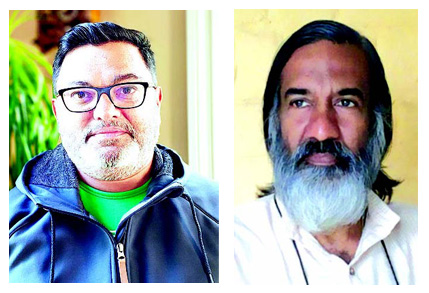
Steve Correa , Raghu Ananthanarayanan
In our previous articles on November 2 and 12, 2023, we elaborated on the nature of conflicts and argued the Dharmic response. We held that there is a need to remove the victimhood phenomenon. This refers to avoiding to adopt a victim mentality, which involves seeing oneself as a perpetual victim of circumstances or the actions of others.
Before delving into this serious topic, let us look at the story of King Canute (and repurpose it a bit). Once, the great King went to the seashore to enjoy the waves. He was pleased when they gently washed over his feet. Suddenly, a big wave came up and knocked the King over! He was furious and tried to order the waves to behave!!
All of us do this internally in no less dramatic ways. We experience pleasure and pain. We develop strategies to escape pain and capture pleasure, or so we think! We believe that the world will respect these strategies. We are soon rudely reminded that the waves are part of nature and cannot be commanded. Yet, we often create more impregnable defences based on what we have learnt, or so we think. The upshot of all this is the victim inside keeps growing with each big wave that topples us. My pain and loss of the cosy corner is due to the ugly other, and we become easy prey for the ‘saviour’ to come along and promise paradise!! Or we go about building the more impregnable fortress.
Being a victim has a specific power. The victim narrative goes like this: “Poor me! I am helpless and powerless! He/she/it/they made me this way! I am not to blame for the way I am. Someone else is”. It offers a license to explain my aggression. It makes me feel wronged, hurt and resentful. Moreover, it allows me to continue with ‘othering’ the other. Playing victim makes me feel sorry for myself and avoid taking ownership and responsibility. There are many examples where societies/cohorts have come from that location. For instance, the Jewish population that survived the Holocaust faced unimaginable atrocities. While their victimhood was undeniable, it also became a defining element of their identity, influencing cultural, societal, and political narratives for decades, even to the present day. This is true for Civil Rights Movements of being victims of racial discrimination and their struggle for equality and empowerment. Many indigenous populations worldwide suffered immensely under the yoke of colonial powers, experiencing dispossession, cultural suppression, and marginalisation. Their victimhood forms a core part of their historical narrative and ongoing struggles for recognition and rights.
What makes the victim’s location enticing is its helplessness and implied lack of choice. However, two things are hidden in this universally accepted idea. Firstly, the anger and the rage that well up inside the victim. This gets compounded by fear, and the concoction is a violent bomb waiting to explode. Secondly, the victim is rarely able to examine how they hold their victimhood long after the victimising incident is over. Remaining entrenched in victimhood prevents me from joining in to take responsibility for resolution, repatriation and healing. It also blinds me from seeing how I harbour vengefulness. There is often a great deal of power gained by the ‘saviour’ feeding one’s victimhood and pointing to the ‘oppressor’ out there. Unresolved victimhood leads to violence against oneself and others. This very widespread human propensity is exploited to the hilt by every ‘ism’ and every advertisement.
To end these calls for inner courage, some help from a good facilitator and a genuine desire to look at oneself from a vantage of inner quietude. The process of ‘letting go’ is quite a struggle. As Adhana is required to help in the healing. There are several practices in Indic tradition to support deep healing. One can only free oneself by doing the work; otherwise, you keep playing the game of fight, flee, freeze, or fawn.
Right contemplation is learning to look at ourselves and our world from the proper distance and frame of mind. We can then accept the reality that the world is constantly changing and that the world will come to us in a hundred different ways. The world is indifferent to us, whether we are kings or paupers! If we do not run away from pain but face up to it, the conditions that create pain will change. It is the same with pleasure or any challenge. We gain deep insight because we do not give into the dynamics of fear and victimhood. This inner work is done alone, but the presence of wise healers can go a long way to dissolving the hurts and the deep desire to seek refuge.
Each person must take the responsibility for dissolving their own ‘Victimhood’ narrative. This isn't easy to do. Unfortunately, much later in life, one becomes aware of how deeply one’s victim voice drives one’s engagement with the world. Acceptance of the trauma is the first step. Often, this trauma is not only ‘what happened to me’. It is also how we stay entrenched in fear. In some cases, we may hold notions about being strongly victimised by some group; sometimes, the experience is borrowed on behalf of the family and its history. The consequent feeling of rage may not be mine but a selective response, deeply patterned, conditioned and encoded within me.
Recognizing victimhood’s potency and the narratives it creates is vital in fostering empathy, understanding, and seeking resolution. While victimhood can provide a sense of identity and false solidarity, it is essential to balance acknowledgment of past suffering with a willingness to engage in the healing process, take responsibility, and work towards resolution without perpetuating cycles of blame or resentment.
(Steve Correa is an Executive Coach and Author of The Indian Boss at Work, Thinking Global, Acting Indian;
Raghu Ananthanarayanan is a behavioural scientist, yoga teacher and author of several books)
